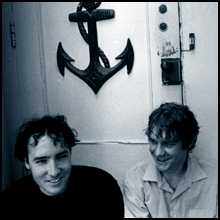![[Sidebar]](/standard/image/sidebar.gif)
![[Music Reviews]](/standard/image/headers/music_reviews_header.gif)
| clubs by night | club directory | bands in town | concerts | hot links | reviews & features |
A whale of a disc
Astoveboat update Melville on New Bedford
by Michael Caito
Astoveboat
Half-stumbling, half-sliding across a deck slick with the oil of fish guts and whale blubber, a giant gray sea canopied by a giant gray sky overhead, the crewman finally gains and collapses into his narrow bunk. Hair matted, calloused hands cracking and bloody, nose raw from sun, wind and snot, he crashes for four hours then gets up and repeats the previous day's labors for 20 hours straight. They're two days 'til shore, maybe one if nets or harpoons find their mark.Very few occupations boast the dangers intrinsic to those who man fishing and, in the past, whaling boats, and while you may question the authenticity of that opening paragraph, two opinions you unfortunately won't get are those of two gentlemen -- one missing at sea and the other whose body washed ashore last week at Horseneck -- who perished in the line of duty last week off New Bedford. Three survived.
The Whaling City is the setting for Astoveboat's '98 debut New Bedford, now heading into its second pressing, according to a Load Records spokesman last week. The duo of bassist Tom Coucci and drummer Dale Cunningham go a long way toward capturing the isolation, camaraderie, omnipresent tension and peril of harvesting the open sea. Throughout the dozen-plus tracks there is a recurring background sound of a Morse Code machine sending signals, which lend another layer of danger and nerves over those already stretched thin by Cunningham's unconventional drumkit (featuring a 55-gallon boombox, among others)and Coucci's walloping basslines.
Nautical -- and specifically whaling -- themes are unmistakable in Astoveboat titles (three "Seaweed"s, "Thee Ungodly Squall," "The Log Pt. 2"), but the duo have no difficulty with saminess, which given the instrumentation and both their tendencies to shout lyrics in a more or less monotonal style, is a deft turn. That's a tribute to their muscular playing and stellar engineering/production work by longtime Six Finger Satellite guitarist John MacLean, twisting knobs at the Parlour in Pawtucket.
The album's strengths, having held up over several months of listening, lie in its ability to recreate the seemingly contradictory feelings of claustrophobia versus a giddy sense of freedom during a whaling or fishing voyage. Anyone who has ever wet a line (never mind battled mammoth sea critters or raced a quick-developing storm to shore) may have tasted a flavor, but Astoveboat, through the guttural power of their pulsating bottom end, can recreate a plethora of life-threatening experiences, though some are nicked from recognizable nautical folklore. Historic chants yo-ho-hoing bottles o' rum are now bottles of rye, sirens and mermaids are inner demons in "Testes" and "Oh Apparition!," and high-seas treachery and loyalty are captured in "Jonathan Bourne" and "It'll Crawl." My fave comes early on "The Log Pt.2," a cautionary preacher's tale full of brackish wisdom, as he describes a motley crew: a thieving captain, a former prostitute running the galley, and a First Mate-cum-heroin trafficker, all joined by this gnarled man of the cloth whose only Sacrament is a deep respect for . . . the deep: "Me I'm just a preacher, and I don't have much to teach ya / Steer clear of fog and keep a log and don't swim with fish that'll eat you."
But it's the preacher's description of the sacrosanct faith in this vessel -- the vessel to which he entrusts his life on every voyage -- which also serves as an apt description of Astoveboat, and makes this record both emotionally rewarding and, ultimately, historically significant. "This boat floats like an anchor / but we always remember to thank her/she's never gone down and she never ran aground / there's not another boat that could sink her."
Ahab to Quint, Stevenson to Dana to The Perfect Storm. Even in high-tech 1999, legends die hard in New Bedford.
STARS & BARS. The Classical Series resumes at Vets on Saturday when pianist John Browning joins Larry Rachleff and the Philharmonic. The program is a by-now familiar mix of premieres, old and new, as the orchestra debuts Scott McAlister's In Silent Thunder, dedicated by McAlister (whom Rachleff met at Rice University inHouston where the music director lives and works) to the victims of and families affected by the Oklahoma City bombing. Browning will perform Beethoven's Piano Concerto No. 4 in G, Op. 58, and Bela Bartok's The Miraculous Mandarin Suite, inspired by a pantomime first published in a magazine in 1917 (I leave it to you to determine exactly how one goes about publishing a pantomime in a magazine). Its planned 1931 debut in Budapest was cancelled by skittish censors fearful of the topic, a tale of an abducted Mandarin who somehow survives suffocation, impalement and lynching at the hands of robbers before dying in the arms of the woman the robbers had used to ensnare victims. Thrills and chills on Saturday night at Vets.
Sunday finds thrills of a different variety as Fan Attic Records celebrates the release of the fourth in the Runt of the Litter series of compilations, which features tracks by Miniwatt (formerly Broadcaster) and performances, at the Met, by Arson Family, the Lombardies, Double Nuthins, Highway Strippers, Ashley von Hurter & the Haters and maybe more. That is one mean lineup.
CAV has a grabber of a weekend, with Paul Geremia on Friday; Saturday brings saxophonist Greg Abaté with bassist Paul DelNero, Art Marco on the ivories and Artie Cabral on drums.
| home page | what's new | search | about the phoenix | feedback |
Copyright © 1999 The Phoenix Media/Communications Group. All rights reserved.
